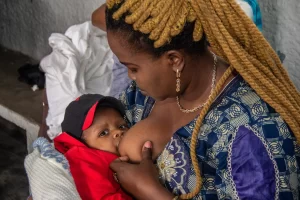CLAIM: To date, 24 African women have served as heads of state or govt across 17 different countries, but only 3 | Ellen Johnson Sirleaf (Liberia) Samia Suluhu Hassan (Tanzania) and now Netumbo Nandi-Ndaitwah (Namibia) | have actually won elections through direct popular vote.
SOURCE: Account on X
VERDICT: Partly true
On March 4, 2025, SABC news anchor Peter Ndoro posted a message on X (formerly Twitter), claiming that 24 African women have served as heads of state or government across 17 different countries but only three – Ellen Johnson Sirleaf (Liberia) Samia Suluhu Hassan (Tanzania) and now Netumbo Nandi-Ndaitwah (Namibia) – have won elections through direct popular vote.
According to Dabafinance.com, from elected presidents to acting heads of state and prime ministers, twenty-four (24) African women, including the recently elected President of Namibia, Netumbo Nandi-Ndaitwah, have so far risen to the highest offices in their respective countries, breaking barriers in traditionally male-dominated political spaces.
The website lists African women leaders as follows:
Elected Presidents
- Netumbo Nandi-Ndaitwah (Namibia, December 2024 – Present)
- Sahle-Work Zewde (Ethiopia, October 2018 – October 2024)
- Ameenah Gurib-Fakim (Mauritius, June 2015 – March 2018)
- Ellen Johnson Sirleaf (Liberia, January 2006 – January 2018)
- Joyce Hilda Banda (Malawi, April 2012 – May 2014)
Acting/Interim Presidents
- Samia Suluhu Hassan (Tanzania, March 2021 – Present)
- Catherine Samba-Panza (Central African Republic, January 2014 – March 2016)
- Agnès Monique Ohsan Bellepeau (Mauritius) March to July 2012, and May to June 2015,
- Rose Francine Rogombé (Gabon, June 2009 – October 2009)
- Ivy Matsepe-Cassaburi (South Africa, September 2005)
- Sylvie Kinigi (Burundi, October 1993 – February 1994)
Current Prime Ministers
- Victoire Sidémého Dzidudu Dogbé Tomegah (Togo, September 2020 – Present)
- Rose Christiane Ossouka Raponda (Gabon, July 2020 – Present)
- Robinah Nabbanja (Uganda, June 2021 – Present)
- Najla Bouden Romdhane (Tunisia, October 2021 – Present)
- Saara Kuugongelwa-Amadhila (Namibia, March 2015 – Present)
Former Prime Ministers:
- Luísa Dias Diogo (Mozambique, 2004-2010)
- Maria das Neves Ceita Baptista de Sousa (São Tomé and Príncipe, 2002-2004)
- Mame Madior Boye (Senegal, 2001-2002)
- Elizabeth Domitien (Central African Republic, 1975-1976)
- Cissé Mariam Kaïdama Sidibé (Mali, 2011-2012)
- Aminata Touré (Senegal, 2013-2014)
- Maria do Carmo Trovoada Pires de Carvalho Silveira (São Tomé and Príncipe, 2005-2006)
- Agathe Uwilingiyimana (Rwanda, 1993-1994)
Africa Faith & Justice Network lists 10 African women presidents across 9 countries who have served as heads of state and these are:
1. Slyvie Kiningi, Acting President of Burundi (February – October 1993)
2. Ivy Matsepe-Cassaburi, Acting President of South Africa (September 2005)
3. Ellen Johnson Sirleaf, President of Liberia ( January 2006 – January 2018)
4. Rose Francine Rogombe, Interim President of Gabon (June 2009 – October 2009)
5. Agnes Monique Ohsan Bellepeau, Acting President of Mauritius (March – July 2012 and May – June 2015)
6. Joyce Hilda Banda, President of Malawi (April 2012 – May 2014)
7. Catherine Samba, Acting President of Central African Republic (January 2014 – March 2016)
8. Ameenah Gurib-Fakim, President of Mauritius (June 2015 – March 2018)
9. Sahle-Work Zewde, President of Ethiopia (October 2018 – Present)
10. Samia Suluhu Hassan, President of Tanzania (March 2021 – Present)
Africa.com lists 22 African women who have served as heads of state. The website defines Women Heads of State as women who have served as president or prime minister, including Heads of State and Heads of Government. These women must have been elected or appointed since 1970 and served at least three months. Female monarchs are omitted.
As of 2022, according to the United Nations Economic Commission for Africa (UNECA), Ethiopia and Tanzania are the two countries in Africa with female presidents. UNECA further says: ‘In addition, Africa has five prime ministers: Rose Christiane Ossouka Raponda of Gabon, Saara Kuugongelwa of Namibia, Najla Bouden of Tunisia, Dogbe Tomegah of Togo and Robinah Nabbanja of Uganda.
How did Ellen Johnson Sirleaf, Samia Suluhu Hassan, and Netumbo Nandi-Ndaitwah assume office?
Ellen Johnson Sirleaf
Sirleaf was first sworn in as Liberian and first-ever African woman president on January 16, 2006, after winning the November 8, 2005 runoff election and defeating soccer legend George Weah. In October 2011, Sirleaf went on to win another presidential runoff election, garnering more than 90 percent of the vote. She stepped down in January 2018 when her two terms ended.
Samia Suluhu Hassan
Hassan was selected as running mate of CCM presidential candidate John Magufuli in the October 2015 election after which she was sworn in as vice president on November 5. Following the death of Magufuli in 2021, Hassan was sworn in as president on March 19 to complete the remainder of his second term. She has since been nominated CCM presidential candidate in the next general elections set for October this year.
Netumbo Nandi-Ndaitwah
The Electoral Commission of Namibia (ECN), declared Netumbo Nandi-Ndaitwah of the governing SWAPO party, duly elected President of the Republic of Namibia after garnering a total of 638, 560 votes in the November 2024 general elections. She is set to be inaugurated on 21 March 2025.
Conclusion
The claim: ‘To date, 24 African women have served as heads of state or govt across 17 different countries, but only 3 | Ellen Johnson Sirleaf (Liberia) Samia Suluhu Hassan (Tanzania) and now Netumbo Nandi-Ndaitwah (Namibia) | have actually won elections through direct popular vote,’ is partly true in that while Sirleaf and Ndaitwah have directly contested and won elections, the same cannot be said of Hassan. She is currently completing the remainder of the term of Magufuli, her predecessor who died in March 2021.











